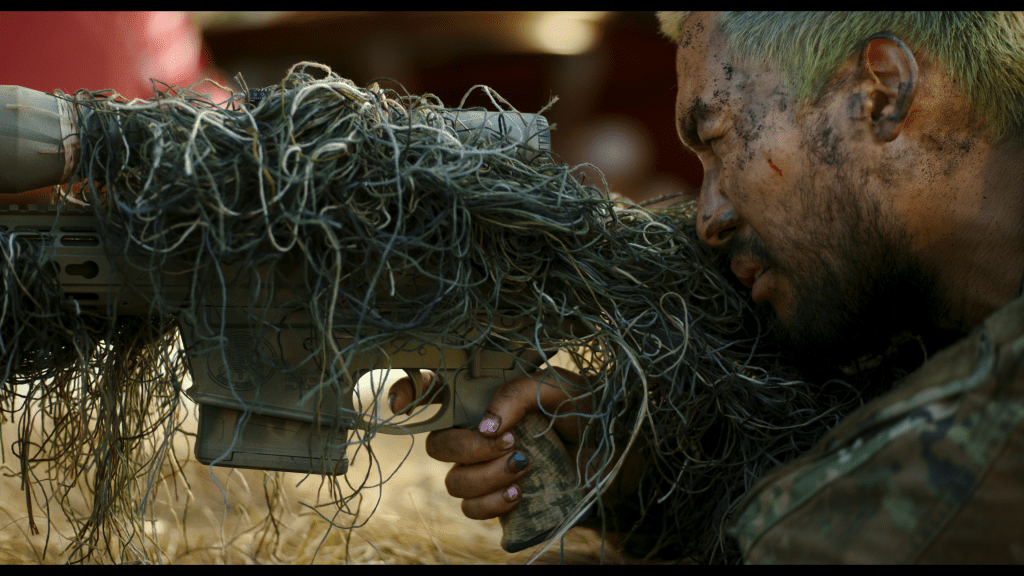Alex Garland’s Civil War is not the film it’s marketed to be. Yes there is a civil war between the US government and multiple rebel states, and the trailers and studio publicity would have you believe that is the main focus of the film. But it’s not. Instead, Civil War is shot through the eyes of photojournalists who are determined to capture the raw destruction that is happening basically on their front lawn. As members of the press, they’re not there to pick a side, just as the film itself doesn’t blatantly do the same, either. Their goal is to simply document everything they see and not intervene. That is easier said than done, however. Civil War is about the observers and not the participants and the cost of inaction. It explores this through tense and brutal scenes of action and war. Civil War doesn’t care what side you’re on, because in the end war destroys us all.
Photojournalist Lee Smith (Kirsten Dunst) rose to prominence photographing wars overseas but her latest assignment now has her documenting the war going on in her own backyard. What used to be the United States of America has fractured into various militias including the Western Forces and the Florida Alliance who are using whatever means necessary to overthrow a fascist President (Nick Offerman) as he struggles to hold onto power. As the rebel forces inch closer and closer to the capitol, Lee makes the decision to travel from New York City to D.C. to try and get an interview with the President. She is joined by fellow journalists Joel (Wagner Moura) and Sammy (Stephen McKinley Henderson) along with an aspiring young photographer named Jessie (Cailee Spaeny) who looks up to Lee as a mentor and inspiration. The hundreds of miles to the capitol is fraught with danger and just because they’re press doesn’t always mean they’ll get a warm welcome from the people they encounter. As they get closer and closer to their destination, the war efforts intensify and Jessie quickly learns what it means to be a wartime photographer, for better and for worse.
Civil War starts well after the United States became divided and doesn’t go into much detail as to what all lead up to the moment the movie starts. There are a few key lines that reveal some of the events that happened like how the President issued air strikes on civilians, but the full picture is never shown. Instead the focus is on Lee and her journey to the capitol. As a photojournalist, her job it to capture moments as they happen. She is supposed to be a neutral bystander who doesn’t get involved on either side of a conflict. She’s there to document and detail, never engage. That can be difficult when there are atrocities happening all around you. Shouldn’t you feel morally obligated to help someone who is bleeding out and in need? How can a person stand by and take pictures when surrounded by so much violence? For Lee and her fellow journalists it doesn’t seem to cause much of an issue because they’ve been a part of the business for so long. But for Jessie it’s a whole different story.
Jessie is still young and immature, but she has a good eye for the camera. It’s part of the reason why Lee decides to take her with them on this dangerous trip. There is an initial hesitation from Jessie when she gets her first taste of warfare. The shock and trauma of what she sees causes her to freeze up and not even get a single picture. Meanwhile Lee and the others act like it’s just another day at the office. The juxtaposition between the two can be alarming. War isn’t supposed to illicit neutral feelings. There’s no sense of comfort to it. And yet in today’s news cycle, war is often treated just like that. Deaths are just a number on the screen. We’ve become so accustomed to hearing the news about it all that it barely even registers. There’s no direct impact on most of us individually so it doesn’t really matter. But it should. And that’s Civil War‘s strongest theme.
As the film progresses and Jessie witnesses more and more horrors of war, she adjusts to it and becomes more brazen in her photography. She doesn’t hesitate or think about anything else other than getting a great picture. Even more so, she’ll actively put herself in harms way in order to get that perfect shot. Meanwhile the opposite is true for Lee and her colleagues. They’ve been so accustomed to war in other countries. There it’s easier to distance yourself from what you’re seeing. When the war is in your own country between your fellow neighbors, that’s when it becomes more difficult to be just an observer. At one point along the way, Lee and the group travel through a small town and they’re put off by the calmness and casual nature of everyone who lives there. People are walking their dogs, jogging, and opening their stores as if there isn’t a civil war going on all around them. When asked by Joel, a store own remarks that they just try and stay out of it. It’s a great scene because it highlights the absurdity of the situation. How came someone carry on with their normal day when everything happening around them is far from normal? Civil War makes you question what actions should be taken and if they’re enough, not from a soldier’s perspective but from a citizen’s.
Lee always thought that she was sending a warning back to the states through the pictures she took; that her work captured the ugliness and horrors of war so well that the United States and its citizens would see them and learn to do whatever was necessary to never let that happen in the country. And yet here things are. Clearly just taking pictures of war wasn’t enough. Despite her hardened exterior, the foundation she built her entire career off of becomes cracked.
Civil War is not so much about a civil war going on but the reaction too it. It stirs within audiences a call to action with gripping imagery and some of the most intense war scenes of the year. Whether you’re captivated by the story its telling or not, there is no denying that Civil War is a visually stunning work of art. The level of crisp detail in every frame is awe-inspiring and only intensifies some of the more chilling moments in the film. Civil War is not the film I expected from the trailers, but it’s another captivating exploration of humanity from Alex Garland.
-
Civil War
Summary
Civil War is about the observers and not the participants and the cost of inaction. It explores this through tense and brutal scenes of action and war. Civil War doesn’t care what side you’re on, because in the end war destroys us all.








